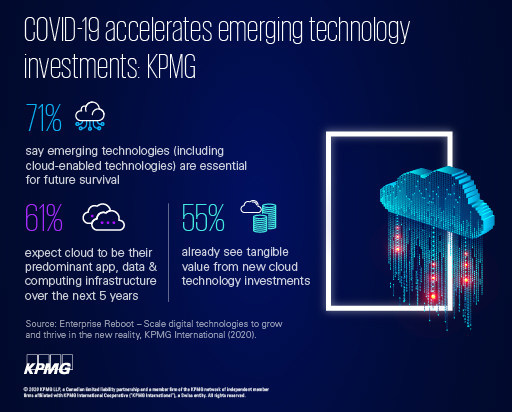
Emerging technologies are essential for future survival: KPMG
by CM Staff
Canadian companies under invest in disruptive technologies compared to American counterparts

HFS infographic (CNW Group/KPMG LLP)
TORONTO — Seven out of 10 Canadian technology executives say that emerging technologies are essential to their organization’s future survival, according to a recent report by KPMG International and global industry analyst firm HFS Research.
Yet, they are under investing in disruptive technologies compared to their U.S. peers, finds the Enterprise reboot report which explores both the investment and progress in adopting 5G, artificial intelligence (AI), blockchain, edge computing, hybrid and/or multi-cloud, process automation, and smart analytics.
U.S. companies currently spend on average US$17 million per technology — 30% more than what Canadians spend — underscoring the importance they place on the agility and competitive edge that disruptive technologies can deliver to the organization.
“We’re starting to see a sea-change in how the C-suite views technology because of the COVID-19 pandemic, with over four in five Canadian CEOs now prioritizing technology investments,” said Stephanie Terrill, business unit leader, management consulting, KPMG in Canada, in a prepared statement. “Canadian CEOs recognize they need to make the right investments to help them build resilience and emerge stronger from this crisis.”
KPMG’s recent Global CEO Outlook found that 84% of Canadian CEOs are now prioritizing their technology investments to meet growth and transformation objectives, and the vast majority (92%) say COVID-19 has accelerated the digitization of their operations.
The Enterprise reboot report notes that CTOs in Canada say that the main barriers for investing in emerging technologies are fear the technology won’t work, challenges in changing the organizational culture, and the lack of talent or skillset in implementing the technology to achieve business outcomes.
The report also finds that Canadian and American companies differ in their digital transformation objectives. Canadians cited “cost reduction” and “improving decision making” as their top reasons for investing in emerging technologies. By contrast, their U.S. counterparts identified “future survival” and “business model transformation” for investing in emerging technologies. On both sides of the border, “improving brand value” was a common goal.
Six in 10 (63%) technology executives in Canada believe that the combined use of emerging technologies is much more beneficial than using any of these technologies in isolation. But, that’s significantly below the 75% of U.S. respondents who see a benefit in the power of multiple technologies.
The report also finds that hybrid or multi-cloud, which refers to the use of both private and public cloud services, will become the predominant app, data, and computing infrastructure over the next five years. Six in 10 (61%) respondents in Canada hold this view, compared to 70% in the U.S.
And, more than half (56%) of respondents in the U.S., U.K., and Germany called cloud migration “an absolute necessity” due to COVID-19, underscoring the growing importance of cloud transformation.
“The shift to working from home and dealing with customers online is motivating companies to embrace cloud solutions,” said Amardeep Johar, partner and head of KPMG in Canada’s cloud-based Powered Enterprise team. “The cloud helps organizations to be more agile in response to their customer needs, scale quickly to meet market demand, and operate more securely.”
More than half (55%) of Canadian technology executives say they are already seeing tangible value to the business from their hybrid cloud and/or multi-cloud investments.
The research also points out that for Canadian companies, one of the most-important advantages for deploying the cloud is so-called “containerization” in which software code is packaged or encapsulated into a “container” that is separate and portable from the host operating system and can run uniformly and consistently across any platform or cloud, free of issues.